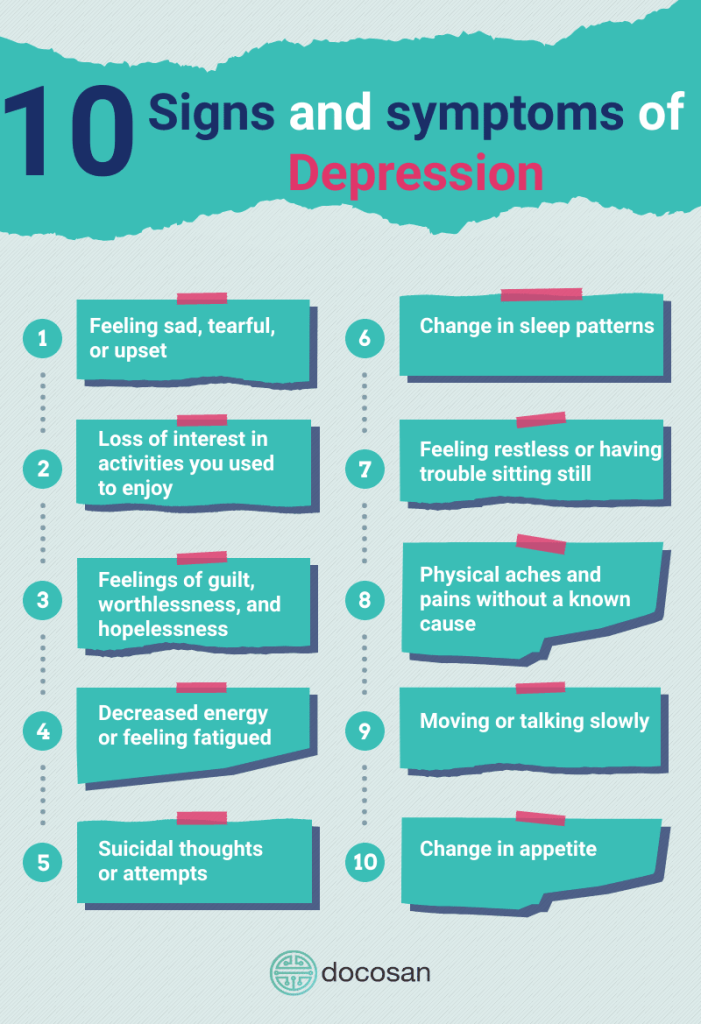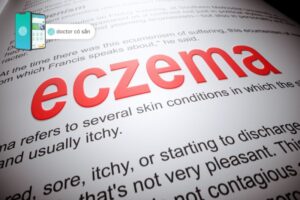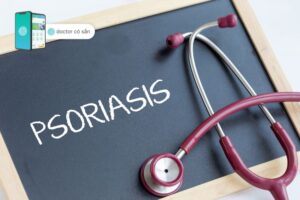Mental Health disorders (also known as mental illnesses) affect nearly 1 billion people a year. People may have occasional mental health concerns or they can be long-lasting (chronic).
A mental health concern becomes a mental health disorder when ongoing signs and symptoms affect your daily functioning and cause you repeated stress.
Some mental disorders are more common than others, in this article Docosan takes an in-depth look at the 5 most common mental health disorders.
First, we take a look at what they are. Then, give you useful information on how to recognize them in yourself as well as friends and family, and lastly (most importantly) recommend the best English-speaking therapists where you can find help.
List of Common mental disorders:
- Mood disorders
- Anxiety disorders
- Dementia
- Eating Disorders
- Schizophrenia and other Psychoses
Tóm tắt nội dung
- 1 Mood Disorders
- 2 Depression
- 3 What is depression?
- 4 Signs and symptoms of depression
- 5 What are the risk factors for depression?
- 6 How is depression diagnosed?
- 7 Do you see a general practitioner or psychiatrist for depression?
- 8 What is the treatment for depression?
- 9 Anxiety disorders
- 10 What is an Anxiety Disorder?
- 11 Signs and symptoms of anxiety disorders
- 12 Generalized Anxiety Disorder symptoms
- 13 Symptoms of Panic Disorder
- 14 How are Anxiety Disorders diagnosed?
- 15 What is the treatment for anxiety?
- 16 Dementia
- 17 Types of Dementia
- 18 What are the symptoms of Dementia?
- 19 What is the treatment for dementia?
- 20 Eating disorders
- 21 Symptoms of eating disorders
- 22 Anorexia nervosa
- 23 Symptoms of Anorexia
- 24 Bulimia nervosa
- 25 Symptoms of Bulimia Nervosa
- 26 Binge-eating disorder
- 27 What is the treatment for eating disorders?
Mood Disorders
Most of us feel sad from time to time, however, a mood disorder is different. It affects your everyday emotional state. Mood disorders include Major depression and Bipolar disorders.
Depression
Depression is a very common mental disorder and one of the leading causes of disability worldwide. An estimated 264 million people are affected by depression. It affects more women than men.
What is depression?
Depression is a mood disorder characterized by a lowering of mood, loss of interest, and reduced energy.
It is not just feeling sad! We all have times when our mood is low and our thoughts may not be very positive.
However, when your negative thoughts & sad feelings are recurring and start interfering with your daily life, it could be a sign that you are experiencing depression.
Depression can be mild, moderate, or severe – depending on the impact your symptoms have on you. People may move between mild, moderate, and severe depression during one episode or across different episodes.
There are many different types and symptoms of depression.
Signs and symptoms of depression
You do not have to have all of these to be diagnosed with depression. You might have just experienced some of them.
Common signs and symptoms of depression include:
- Feeling sad or a low mood, tearful, or upset
- Loss of interest or enjoyment in hobbies and activities you used to enjoy
- Feelings of guilt, worthlessness, and hopelessness
- Decreased energy or feeling fatigued
- Difficulty concentrating, making decisions, or remembering things
- Changes in appetite- eating more or less than usual
- Suicidal thoughts or attempts
- Changes in sleep patterns, sleeping too little, or oversleeping
- Feeling restless or having trouble sitting still
- Moving or talking slowly
- Physical aches and pains, cramps, or digestive problems without a known cause and /or doesn’t ease with treatment.

It is important to note that not everyone who is depressed will experience every symptom. We are all different and some people experience only a few symptoms, while others experience many. Read more about what depression feels like * cluster topic
Depression is a mental illness, it is not something you can merely snap out of. It is something that anyone can get, it is not a sign of weakness.
Anyone can get depression, but there are several risk factors that could make someone more vulnerable to getting it.
What are the risk factors for depression?
Current research suggests that several factors can play a role in the onset of depression. Some of these factors are:
- Biochemical factors: Abnormalities in brain chemicals, specifically serotonin, and norepinephrine, might contribute to symptoms of depression including fatigue, anxiety, and irritability.
- Genetics: Depression can run in families. For example, according to the American Psychiatric Association (APA), if one identical twin has depression, the other has a 70% chance of developing the illness sometime in their life.
- Personality traits: people with low self-esteem, pessimism, or those easily overwhelmed by stress appear to be vulnerable to depression.
Environmental factors: Past abuse, neglect, and exposure to violence can make some people susceptible to depression. Life events such as the death of a loved one, a breakup, or financial difficulties can bring on depression.
Lastly, a medical condition like a brain tumor or head trauma can cause depression, so it is important to be evaluated by a psychiatrist or other physician to rule out general medical causes.
How is depression diagnosed?
Several reoccurring symptoms in addition to low mood are required for a diagnosis of major depression. Symptoms must also last at least two weeks and must represent a change in your previous level of functioning for a diagnosis of depression.
Do you see a general practitioner or psychiatrist for depression?
If you have symptoms of depression, your next step should be a visit to a general practitioner for a thorough exam and screening. You will be asked about your health history and risk factors.
General practitioners and family doctors screen for depression and may prescribe antidepressants, but may also provide a referral for a psychiatrist, psychologist, or counselor.
The general practitioner should rule out several medical conditions that can contribute to symptoms of depression such as:
- female hormonal changes
- Thyroid conditions
- Medication side effects.
If a medical condition is ruled out as a cause of your depression they may prescribe antidepressants or refer you to a mental health professional.
What is the treatment for depression?
Untreated depression can cause lasting issues that include:
- Employment issues
- Drug and alcohol abuse
- Relationship problems
- Suicidal thoughts or attempts
Luckily, Depression, even the most severe cases, can be treated. In fact, depression is the most treatable of mental disorders.
Approximately 80% to 90% of people with depression eventually respond well to treatment, and almost all gain some relief from their symptoms
Depression is treated through medications such as antidepressants, psychotherapy, or a combination of the two.
If you or your loved one is diagnosed with depression and seeking help from a psychologist, It’s important to choose the right therapist with whom you feel comfortable.
With the online therapists’ consultation feature on Docosan you can easily connect with experts and mental health clinics in the privacy of your own home. The feature allow you to easily connect to a therapist, read reviews and compare services and prices.
Anxiety disorders
Anxiety is often a normal human reaction to common stressors in life, you may feel anxious when faced with a problem, before making a decision or taking a test.
However, anxiety disorders involve more than just temporary worry and fear. For someone with an anxiety disorder, the anxiety does’nt go away. In many cases, the anxiety get’s worse over time if left untreated.
The symptoms affect the person’s ability to function normally in their daily lives.
What is an Anxiety Disorder?
Anxiety disorders are a group of mental health problems. According to the American Psychiatric Association, anxiety disorders are the most common of mental disorders and affect nearly 30% of adults at some point in their lives.
There are several types of anxiety disorders, including generalized anxiety disorder, panic disorder, and various phobia-related disorders. Depression is often related to anxiety disorders.
Signs and symptoms of anxiety disorders
The main features of an anxiety disorder are fears or thoughts that are constant. They cause a person significant stress and interfer with daily living.
Generalized Anxiety Disorder symptoms
According to the National Institute for Mental Health (NIMH), people with generalized anxiety disorder (GAD) display excessive anxiety or worry, most days for at least 6 months.
They worry excessively about a number of things such as their personal health, work & social interactions, as well as everyday routine life circumstances. Fear and anxiety can cause significant problems in areas of their social, work, and school life.
Generalized anxiety disorder symptoms include:
- Feeling restless, wound-up, or on-edge
- Decrease in energy or fatigue
- Difficulty concentrating
- Irritability
- Muscle tension
- Difficulty controlling feelings of worry and fear
- Sleep problems, such as insomnia and restlessness
Symptoms of Panic Disorder
People with panic disorder experience unexpected panic attacks. Panic attacks are sudden periods of intense fear that happen very quickly and reach their peak within minutes.
Panic attacks can be very frightening and can occur when there is no real danger or obvious cause.
They can occur unexpectedly or can be brought on by a trigger, such as a feared object or situation.
During a panic attack, people can experience:
- Sense of impending doom or danger
- Heart palpitations or an accelerated heart rate
- Fear of loss of control or death
- Sweating
- Trembling or shaking
- Shortness of breath or tightness in the throat
- Chills
- Hot flashes
- Nausea
- Abdominal cramping
- Chest pain
- Headache
- Dizziness, lightheadedness, or faintness
- Numbness or tingling sensation
- Feeling detachment
People with panic disorder often worry about when the next attack will happen and try to prevent future attacks by avoiding things that may trigger them such as certain places, situations, or behaviors they associate with panic attacks.
Worrying about panic attacks, and the effort spent trying to avoid attacks, can cause serious problems in various areas of the person’s life.
How are Anxiety Disorders diagnosed?
A doctor or mental health professional may do a physical and ask about your symptoms. If they suspect that your anxiety is linked to medication you are taking or an underlying medical condition they may do a blood or urine test.
If the doctor does not find an underlying medical condition they may do a psychological evaluation.
During a psychological evaluation, a specialist asks you more details about your symptoms- when they started, how long they have lasted, and how severe they are. They will also ask if you have a family history of an anxiety disorder or depression.
What is the treatment for anxiety?
The two main treatments for anxiety disorders are psychotherapy and medications. You may benefit most from a combination of the two.
Talk therapy or psychological counseling or psychotherapy involves working with a therapist to reduce your anxiety symptoms.
Cognitive-behavioral therapy (CBT) is the most effective form of psychotherapy for anxiety disorders
If you or your loved one is struggling with Anxiety Docosans partner therapists are highly trained in treating anxiety. With the online therapists’ consultation feature on Docosan, you can easily connect with experts and mental health clinics in the privacy of your own home. The feature allows you to easily connect to a therapist, read reviews and compare services and prices.
Dementia
Dementia is a general term for loss of memory, language, problem-solving, and other thinking abilities that are severe enough to interfere with a person’s daily life. Alzheimer’s is the most common cause of dementia.
Types of Dementia
- Alzheimer’s disease
- Vascular dementia
- Dementia from Parkinson’s disease and similar disorders
- Dementia with Lewy bodies
What are the symptoms of Dementia?
The signs and symptoms of dementia can vary. some examples include:
- Memory loss
- Difficulty concentrating
- Difficulty performing familiar tasks
- Difficulty in planning and preparing meals
- Disorientation in time and space (knowing what day it is or getting lost in a familiar place
- Changes in mood and behaviour
Many conditions are progressive, which means that the signs of dementia start out slowly and gradually get worse. If you or someone you know is experiencing memory difficulties or other changes in thinking skills, don’t ignore them. See a doctor soon to determine the cause. Professional evaluation may detect a treatable condition. And even if symptoms suggest dementia, early diagnosis allows a person to get the maximum benefit from available treatments and provides an opportunity to volunteer for clinical trials or studies. It also provides time to plan for the future.
What is the treatment for dementia?
Currently, there is no cure for dementia, however, there are several treatments and medications that help manage and temporarily reduce the symptoms.
Some medication includes:
- Acetylcholinesterase inhibitors
- Memantine
- Medicines to treat related conditions (There are some conditions, such as heart problems, high blood pressure and depression, that can affect symptoms of dementia)
Alternatives to medication:
- Cognitive stimulation therapy
- Cognitive rehabilitation
- Talking therapies
Eating disorders
Eating disorders are a range of psychological conditions that cause unhealthy eating habits to develop. They might start with an obsession with food, body weight, or body shape.
In severe cases, eating disorders can cause serious health consequences and may even result in death if left untreated.
Most eating disorders involve focusing too much on your weight, body shape, and food, leading to dangerous eating behaviors. These behaviors can significantly impact your body’s ability to get appropriate nutrition. Eating disorders can harm the heart, digestive system, bones, and teeth and mouth, and lead to other diseases.
Symptoms of eating disorders
Symptoms vary, depending on the type of eating disorder. Anorexia nervosa, bulimia nervosa, and binge-eating disorder are the most common eating disorders. Other eating disorders include rumination disorder and avoidant/restrictive food intake disorder.
Anorexia nervosa
Anorexia is a potentially life-threatening eating disorder. It is characterized by abnormally low body weight, intense fear of gaining weight, and a distorted perception of weight or shape.
People with anorexia use extreme efforts to control their weight and shape, this often interferes with their health and life activities.
Symptoms of Anorexia
When you have anorexia, you excessively limit calories or use other methods to lose weight, such as:
- excessive exercise,
- using laxatives or diet aids
- vomiting after eating.
Efforts to lose weight can cause severe health problems, sometimes leading to the point of deadly self-starvation.
Bulimia nervosa
Bulimia is a serious and potentially life-threatening eating disorder as well. When you have bulimia, you experience episodes of bingeing and purging that involve feeling a lack of control over your eating.
Symptoms of Bulimia Nervosa
Many people with bulimia also restrict their eating during the day, which often leads to more binge eating and purging later.
During these episodes, you typically eat a large amount of food in a short time and then try to rid yourself of the extra calories in an unhealthy way such as :
- Vomiting after eating
- exercise too much
- use laxatives
Binge-eating disorder
When you have a binge-eating disorder, you regularly eat too much food (binge) and feel a lack of control over your eating.
You may eat quickly or eat more food than you want to, even when you’re not hungry, and you may continue eating long after you’re uncomfortably full.
After a binge, you may feel guilty, disgusted, or ashamed by your behavior and the amount of food eaten. But you don’t try to compensate for this behavior with excessive exercise or purging, as someone with bulimia or anorexia might. Embarrassment can lead to eating alone to hide your bingeing.
A new round of bingeing usually occurs at least once a week. You may be normal weight, overweight or obese.
What is the treatment for eating disorders?
The type of treatment depends on the eating disorder and symptoms. It usually includes a combination of psychotherapy, nutrition education, medical monitoring, and sometimes medications. Most people with an eating disorder need treatment from a team of health professionals
For people with anorexia nervosa, effective treatment must always include regular and adequate nutrition.
Some of the main psychological treatments used to help people with eating disorders are:
- family therapy (family members work together as a team to directly manage a child’s behaviour)
- cognitive behavioural therapy (works by teaching you to recognise your negative thoughts and beliefs and to challenge them, so that you can change your behaviour)
- interpersonal psychotherapy (focuses on the link between when and how your symptoms started and on problems you have relating to other people)
- psychodynamic psychotherapy (focuses on uncovering what’s on your mind that you are not normally aware of).
- https://www.psychiatry.org/patients-families/depression/what-is-depression
- https://www.nimh.nih.gov/health/topics/depression
- https://www.mayoclinic.org/diseases-conditions/eating-disorders/in-depth/eating-disorder-treatment/art-20046234
- https://www.alz.org/alzheimers-dementia/what-is-alzheimers
- https://www.yourhealthinmind.org/mental-illnesses-disorders/eating-disorders/treatment












